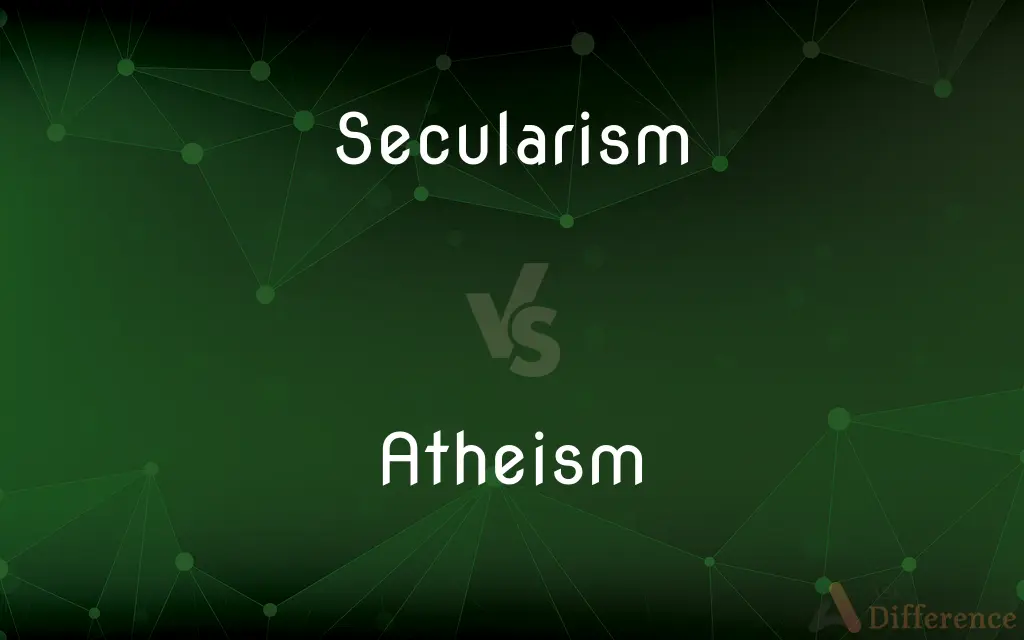Secularism vs. Atheism — What's the Difference?
Edited by Tayyaba Rehman — By Fiza Rafique — Updated on November 1, 2023
Secularism advocates for separating religion from civic affairs and government. Atheism is the disbelief in the existence of deities.

Difference Between Secularism and Atheism
Table of Contents
ADVERTISEMENT
Key Differences
Secularism is a principle that involves the separation of religion from civic affairs and government. It ensures that religious groups don't interfere with state affairs. Atheism, on the other hand, is a personal belief system, or the lack thereof, concerning the existence of deities.
Secularism is about the neutral stance of institutions, particularly governmental, towards all religions. Atheism is an individual's belief stance regarding a single concept: the existence of God or gods.
While secularism seeks to provide a fair playfield for all beliefs and religions in the public sphere, atheism is specifically concerned with the non-belief in a higher power or deity and doesn't address the public sphere's religious neutrality.
A secular society does not inhibit religious practice; it merely does not allow any one religion to dominate the civic space. Conversely, atheism is not a practice but a personal conviction that may not have any direct implications for societal governance.
Secularism can be embraced by theists and atheists alike as it promotes equal treatment and opportunity regardless of religious belief. Atheism is not a political or social policy but a personal conviction that doesn't inherently dictate political or social positions.
ADVERTISEMENT
Comparison Chart
Definition
The separation of religion from government.
The disbelief in any gods or deities.
Scope
Institutional and governmental policy.
Personal belief system.
Aim
To promote neutrality and fairness.
To express a position on the existence of gods.
Relation to Religion
Neutral stance towards all religions.
Rejects the concept of religion altogether.
Societal Role
Organizes society without religious influence.
A personal orientation without policy role.
Compare with Definitions
Secularism
The principle of separation between government institutions and religious institutions.
The country's constitution upholds secularism by not endorsing any religion.
Atheism
The doctrine or belief that there is no god.
Atheism is sometimes misconstrued as a belief in no moral order.
Secularism
The belief that religion should not play a role in government, education, or other public parts of society.
The new law was a victory for secularism, keeping religious symbols out of government buildings.
Atheism
Rejection of belief in a supernatural deity.
Atheism formed the basis of his skeptical inquiry into the universe.
Secularism
The idea that government and laws should not be based on religious beliefs.
Secularism ensures that public education is free from religious indoctrination.
Atheism
A philosophical position that denies the divinity of deities.
In his autobiography, he explains the rationale for his atheism.
Secularism
A doctrine that rejects religion and religious considerations.
Under secularism, state funds are not used for religious festivals.
Atheism
The absence of belief in the existence of deities.
His atheism led him to question religious teachings.
Secularism
The state of being separate from religion.
Secularism in the government prevents the marginalization of minority faiths.
Atheism
Atheism, in the broadest sense, is an absence of belief in the existence of deities. Less broadly, atheism is a rejection of the belief that any deities exist.
Secularism
Secularism is the principle of seeking to conduct human affairs based on secular, naturalistic considerations. It is most commonly defined as the separation of religion from civic affairs and the state, and may be broadened to a similar position concerning the need to remove or minimalize the role of religion in any public sphere.
Atheism
Disbelief or lack of belief in the existence of God or gods.
Secularism
The principle of separation of the state from religious institutions
He believes that secularism means no discrimination against anybody in the name of religion
Atheism
Disbelief in or denial of the existence of God or gods.
Secularism
Religious skepticism or indifference.
Atheism
(narrowly) Belief that no deities exist (sometimes including rejection of other religious beliefs).
Secularism
The view that religious considerations should be excluded from civil affairs or public education.
Atheism
(broadly) Rejection of belief that any deities exist (with or without a belief that no deities exist).
Secularism
Neutrality towards all religions.
State secularism
Atheism
(very broadly) Absence of belief that any deities exist (including absence of the concept of deities).
Secularism
The political belief in the separation of church and state, i.e. the position that religious belief should not influence public and governmental decisions.
Atheism
(historical) Absence of belief in a particular deity, pantheon, or religious doctrine (notwithstanding belief in other deities).
Secularism
The state or quality of being secular; a secular spirit; secularity.
Atheism
The disbelief or denial of the existence of a God, or supreme intelligent Being.
Atheism is a ferocious system, that leaves nothing above us to excite awe, nor around us to awaken tenderness.
Atheism and pantheism are often wrongly confounded.
Secularism
The tenets or principles of the secularists.
Atheism
Godlessness.
Secularism
A doctrine that rejects religion and religious considerations
Atheism
The doctrine or belief that there is no God
Atheism
A lack of belief in the existence of God or gods
Common Curiosities
Is atheism a form of religion?
No, atheism is the absence of religious belief, not a religion itself.
How does secularism affect education?
Secularism promotes education that is neutral regarding religious beliefs.
What is secularism?
Secularism is the principle of separating religious institutions from state institutions.
Can you be religious and support secularism?
Yes, one can practice a religion personally and still support secular governance.
Does secularism oppose religion?
No, secularism doesn't oppose religion; it simply advocates for its separation from state affairs.
Do secular countries ban religious practice?
No, secular countries don't ban religious practice; they allow freedom of religion.
Do atheists celebrate religious holidays?
Some atheists may celebrate cultural aspects of religious holidays without religious intent.
What is atheism?
Atheism is the lack of belief in the existence of any gods or deities.
What's the goal of secularism?
The goal of secularism is to ensure that religious groups do not influence or control government and its decisions.
Is atheism based on science?
While some atheists may base their disbelief on scientific reasoning, atheism itself is not a scientific position.
Can atheists be spiritual?
Yes, atheists can have a sense of spirituality without believing in gods or deities.
Does atheism assert there is no god?
Atheism is the lack of belief in gods, which is not necessarily the assertion that gods do not exist.
Are all atheists against religious practices?
Not all atheists are against religious practices; they simply do not participate in them due to disbelief.
Does secularism mean the state is atheistic?
No, secularism means the state is neutral on religion, not atheistic.
Can a society be secular without being atheistic?
Yes, a society can support the separation of church and state (secularism) without endorsing atheism.
Share Your Discovery

Previous Comparison
Jam vs. Conserve
Next Comparison
Urgence vs. EmergencyAuthor Spotlight
Written by
Fiza RafiqueFiza Rafique is a skilled content writer at AskDifference.com, where she meticulously refines and enhances written pieces. Drawing from her vast editorial expertise, Fiza ensures clarity, accuracy, and precision in every article. Passionate about language, she continually seeks to elevate the quality of content for readers worldwide.
Edited by
Tayyaba RehmanTayyaba Rehman is a distinguished writer, currently serving as a primary contributor to askdifference.com. As a researcher in semantics and etymology, Tayyaba's passion for the complexity of languages and their distinctions has found a perfect home on the platform. Tayyaba delves into the intricacies of language, distinguishing between commonly confused words and phrases, thereby providing clarity for readers worldwide.
















































